#i fucking love meta
Explore tagged Tumblr posts
Text
I will never get over the fact how incredibly isolated Dirk was. Literally the only living thing for MILES was fish & sea gulls. Half of the kids grew up without a guardian, but Jade had Bec, Roxy had the carapacians, Jake had the tinkerbulls (possibly other lusii?) and spoke fondly of his grandma before batterwitch killed her.
But Dirk had nothing. Dirk was so sick of being alone that he cloned himself, and then realised he STILL only had himself for company.
And let's not forget the fact he was attacked by drones regularly. That he was literally fighting for his life. That people talk about & draw Dave's scars. But dirk would be covered in them too. Both for them were forced to fight for their life on that damm roof top.
Dirk is so deeply unstable. To act calm and collected about killing yourself, then kissing your dead friends. That's not someone with a normal sense of self, a normal sense of life. After the game it would take Dirk decades to deal with everything wrong with him.
Bitter isolation and the constant looming threat of death does not make for one healthy man.
#im sorry i am always just so unwell about the fact dirk had nothing but the robots he built#dirk strider#if u disagr33 i kind do wanna hear ur thoughts#i fucking love meta#cw sui mention#from and outside perspective i f33l incredible sadness about dirk and how lonely he would of b33n#then the part of my brain that kins dirk turns on; then its just bitter self loathing#i think dirk is a tragic character but i could never love him; because i dont love myself; and dirk could never love himself; and im dirk#i could never explain how much i HATE that dirk is one of my major kins#there is something deeply with him(me)/me(him)#bwah bwah bwah heart players man -holds up meulin- i am so normal#homestuck#talking lollie
77 notes
·
View notes
Text
hey writers we have to talk.
if you've read any romance or fanfic in the past twenty years (i know you have), you know that there are a certain number of scents associated with hot dudes. you can probably recite the list of Things Men in Fic smell like in your sleep: leather, black pepper, pine, sandalwood, "something uniquely him", clean sweat, and if the character has ever fucking been within 50 yards of a firearm, something called "cordite".
here's the thing.
NO ONE SMELLS LIKE CORDITE.
cordite was a highly specific type of smokeless gunpowder developed in the 1890s by england specifically and used mostly in wwi.
if your good-smelling guy is not (a) english (b) using a very specific type of british rifle (c) dying in a trench in flanders, he does not smell like cordite. technically even if he does meet all those conditions he still doesn't smell like cordite because he smells like trenchfoot.
the point is, cordite is so far from universal that no one but the most hardcore gun nerds give a single shit about it. making your Sexy Hero smell like cordite is like naming a cassette-only bootleg live recording from the 1970s as your favorite grateful dead album. everyone at the party hates you immediately and knows you're doing it for clout. also, it's just factually... wrong. please stop. i know everyone else is doing it, but you can do the right thing here, i believe in you.
so what do people who are using guns smell like?
well if your story is set before the late 1880s, the smell of a fired gun is black powder, which, unfortunately, smells like seventeen flatulent cows have been shoved in a tire factory. trust me, you do not want your Hot Dude to smell like black powder. it's b a d.
if your story is set after the late 1880s, guns are using some variety of modern 'smokeless' powder - which speaking broadly doesn't really have a ton of scent when used. it does have some, but it's sort of non-descript: the best way i can describe it is the sweet, ozone, hot-plate smell of popping your car hood with a warm engine.
people who use guns a lot don't smell like fired guns all the time anyway, so while those scents might work in a fight scene, they're not realistic all the time. but there are some things that your Sexy Shootist will smell like basically 24/7 and that's metal and gun oil. metal you can go and sniff (i recommend non-stainless steel), but if you want a reference, most gun oils have a sharp, organic smell that's not dissimilar to canola oil but muskier and with a tang overtop. it's not unlikely leather is in the mix as well due to routine handling of leather equipment and gear. modern gear also tends to have a certain smell although it varies by production country and storage conditions - lots of opportunities there.
in conclusion: gunslingers and hired killers and military folks can be sexy and smell great on page, but i am begging you not to say "cordite" when you mean "gunpowder" ever again. we can do this. we are writers and therefore pedants. i believe in us!
#i will kiss the first romance writer who makes their MMC smell like cosmoline on the mouth#(actually don't cosmoline smells fucking awful)#firearms#romance novels#fanfic#meta#writing reference#also if anyone has a hypothesis about WHY cordite took off i would love to hear it#historical firearms#nb4 the gun nerds show up yes this post does contain sweeping generalizations about the history of gunpowder
3K notes
·
View notes
Text
the more I play the more I think lucanis basically knows it's illario who betrayed him right from the beginning (he's had a year in the ossuary to think. not that many people knew where he was going. when you ask him 'did Illario know you'd be on that ship' his only answer is the hardest flattest 'yes' you ever heard). so it's not so much about figuring out who the traitor is (because that's ludicrous. we all know. immediately. they didn't really bother to hide it lmao) as about methodically closing off every single avenue of denial lucanis has clung to that whole time with as much or little gentleness as you might prefer until he has no choice but to admit it. because the moment he has to admit it, he'll have to do something -- feel something -- about it. and that's such a catastrophic event in lucanis' inner landscape (he has had TWO people in this whole entire world up until now and will do anything to hold on to them with a heartbreaking child-like desperation, even at and especially through the detriment of his own self) that he'd rather just. not. what if we quite simply. didn't. what if we just stayed here in the emptiness where we can both pretend you didn't hurt me in a way I should never forgive. I have so much practice in that with caterina already it's always worked out great for everyone so far. (press x to fucking doubt but that's trauma logic for you lol)
after everything illario did, so much of the storm of lucanis' emotions around it is 'what the FUCK did you get yourself tangled up in this time and how do I get you out of this mess safely'. what's worse: the fact that your brother murdered you, or that he put himself in horrible danger doing so and thus exposed you to the risk of losing him forever. lucanis' heart certainly has an opinion here and it's fucking unhinged (affectionate)
the themes of dissociation in lucanis' character in general makes me feel nuts. allllll these contradictory messy things he needs to cut off from each other because they can't coexist or be easily reconciled inside him. but all remain stubbornly true separately anyway and will have their due one day. love and resentment. tenderness and fear and rage. terror and longing. love and freedom don't coexist. the burned out golden child anthem is playing in the background. he was always caterina's favourite and he has to keep striving to deserve that dubious honour with every breath he takes and then, presumably, mercifully, some day he will die and be excused and can rest. and until now he's suppressed all the -- natural, healthy, protective! -- negative feelings that threaten the few attachment relationships he actually has, at the cost of ever actually having his needs for connection and safety met and leaving his core self imprisoned and compromised. and spite goes 'what. no. that's dumb fuck that' (*spite voice* I do not understand that and even if I did I would not respect it) and does not allow him to fall back into that, which I think is what saves his life, ultimately. it took being possessed by a demon for lucanis to even contemplate telling anyone he loves 'no' in any way, but hey. whatever gets you there right lol
lucanis is dealing with the freeze response allll the way down baby. and he was even before the ossuary, that just turbo powered it and brought it to a breaking point way before it could happen naturally. but something was going to break eventually no matter what, and I'm just glad that in the end, through the power of friendship and also pure spite, it doesn't have to be him
#I am worried about him all the time. but also: his found family of godslaying maniacs and also the power of love. there are reasons to hope#when there was only one set of footprints in the sand that was the veilguard party holding lucanis in their arms#and going 'excuse you he said no FUCKING pickles!!!' while he's like '🥺should you guys really be -- ' 'YES'#dragon age#dragon age: the veilguard#dragon age: the veilguard spoilers#dragon age spoilers#lucanis dellamorte#dragon age meta#there's some messiness to his arc but what mary kirby managed to capture here about how this works. is everything to me#he is so exactly for me. I'm sorry for all the people he turned out not to be for. but not for him being for me#the gift of looking at him and hearing 'you're more than what you're going through' and be forced to annoyedly go 'okay#MAYBE that could be also be true for me. maybe.' he's going through it. and also so much more and the funniest person in the world#he's so worth it to still have in the world!!!!#I'm so glad we don't get to 'fix' his relationship with his family and especially caterina actually#that is stuff that would need to happen on a time scale waaay outside of the one in this game#and there's Something very real in having to go 'this is not for me to decide for you. who you love and what you do about it is yours'
826 notes
·
View notes
Text
I don’t talk about my love for Kira Nerys too often because. Look. I think if DS9 handles anything well, it’s Kira, hands down.
Her character development is a work of art. She is so traumatised, so angry, so beaten down and STILL FIGHTING at the start. She struggles so much with her PTSD, with the idea that she is ever allowed to be in anything but attack mode…
And then, slowly, gradually, she becomes a whole new person. She laughs, she smiles, she makes corny jokes, she does dumb fun things for the sake of enjoying herself. She has friends, she has a family, she is surrounded by love and joy and HOPE.
Even in the middle of second war, she’s DIFFERENT now. She’s not the same miserable angry person she was, afraid to let go of the vigilant surivival instincts that kept her alive for so long. She’s come back to life as a person who has something to live for.
She has done terrible things. Her hands are stained with blood. She is never going to be able to forget her trauma or the suffering, both her own and that of her people, nor the suffering she inflicted while fighting for her freedom. But she recovers. She heals. She carves out an existence where she is truly, genuinely happy to be alive.
I don’t need to talk about Kira as much as some other characters because this all happens on screen. It’s right there, and it’s beautiful and perfect.
Kira Nerys goes from a person who cannot conceive of herself outside of the horrors she has suffered, inflicted, and fought against, to someone for whom her trauma is just one part of the larger picture, a piece of a rich and vibrant tapestry that is now filled, overwhelmingly, with joy.
Kira Nerys is like, hands down, bar none, one of, if not THE best characters Star Trek has ever created. I love her so much. She is just, completely and utterly perfect, especially in her flaws.
#stella talks#star trek ds9#star trek#kira nerys#.but see I don’t feel compelled to write fics about Kira.#.because I think her writing on the show is already pretty damn close to perfect.#.thanks in no small part to Nana visitor absolutely locking in on exactly who Kira was and should be.#.like she isn’t perfect because she’s flawless.#.she’s super fucking flawed.#.but she’s perfect because she is so flawed and so human and she grows so much and learns to thrive again.#.and god her whole character is just… she’s perfect okay.#.I love her so much I love her I love her I love her I love her.#.like the reason School Live is my favourite manga.#.is because it takes these deeply traumatised kids and then slowly. gradually. shows the#.shows them finding hope and reasons to live and learning to thrive in an absolute nightmare.#.the epilogue made me cry because it showed that they had found ACTUAL HAPPINESS after the hell they endured.#.I am such a sucker for stories about people learning to heal from trauma okay.#.and Kira Nerys is built on a foundation of trauma and she goes and builds a fucking castle on top of it from all the love inside her.#.I can’t emphasise enough how much I love her.#trek meta
709 notes
·
View notes
Text
Fucking FASCINATED by Astarion’s Test of Love with the nymph at the circus.
When she asks
1. When he’s happiest
2. What he wants most
3. What his biggest fear is
You gain approval for responding with the very surface level things that are a little true but not really the real answer.
1. Elbow deep in gore
2. Revenge
3. Breaking a nail
But getting the answers right and truly passing the test means gaining disapproval, because he is both upset that you are saying the quiet parts about himself out loud, and that you are revealing the deepest truest parts of himself to a stranger (the nymph testing you.)
1. Astarion has never been truly happy
2. Freedom
3. Being enslaved
There are so many ways to interpret this, so many ways to play the test out based on your character and your relationship dynamic, and it’s brilliant writing on Larian’s part in that way.
Personally, the way I interpret it is as a parlell to the mirror scene in Act 1.
Astarion is thrilled at what he admits is “shallow praise” because the shallowest parts of his appearance make him feel beautiful.
But, if, when “being reflected through someone else’s eyes” he is instead met with objectively true and more unique qualities of his, like laugh lines and the way his hair curls around his ears, he becomes distressed and begs to just be told he’s beautiful.
Astarion puts a LOT of work into performing his outer persona just as he wants it, he puts a lot of work into controlling how he is perceived.
When in the mirror scene and the Test of Love someone sees past that immediately, seemingly with little effort, he doesn’t know how to handle it.
#bg3 spoilers#bg3#bg3 astarion#astarion#baldur’s gate iii#Baldur’s gate 3#analysis#meta#character analysis#gods I fucking love this game
6K notes
·
View notes
Text
Ideology of Exceptionalism and Gravity Falls; meta and character analysis

I had a whole ago read a post by @icanlife that had a quote by Alex Hirsch on Ford's greatest flaw, and wanted to explore what the flaw is, which is the ideology of exceptionalism; in the exploration, I’ll touch on what it is and how it is used in abusive relationships and cults, as well as how it drives multiple Gravity Falls characters and consequently how it impacts relationships between these characters, and how the show ultimately refutes exceptionalism.
Quick note here; I am not in any way, shape or form a psychologist nor have any formal training in psychology; this is written from my own experiences with this ideology and my own forays into psychology and trauma-informed learning. It is also written with a loose understanding that is likely not broad enough to cover all references to cults, extremist groups and abusive relationships.
The Ideology of Exceptionalism
First of all, we have to get through a drier bit, which is… what is the ideology of exceptionalism and how does it arise? Might be fairly obvious, but it is the belief that you are, or belong to, a group of exceptional people, thus more important and worth more than anyone else; ie, those who don't qualify as 'exceptional'. It is often a subconsciously learned ideology. Now, what qualifies one as exceptional can be extremely varied; generally it revolves around something that provides some form of privilege. Thus, it might be, as the main exceptionalist idea in Gravity Falls, 'intelligence', or power, or it can be such things as attractiveness, quantity of money one has, species, nationality, or skin colour and ancestral heritage. The ideology of exceptionalism, being by nature hierarchical, devalues, and at its worst, openly and violently dehumanizes those who do not qualify as exceptional.
For why exceptionalism occurs is an extremely broad topic, but I've personally found that, for exceptionalism revolving around intelligence, it's a result of a poor sense of self-worth, and having one's self-worth tied to what makes one exceptional. Poor self-worth itself (again, broadly) is a result of childhood trauma from a lack of positive affirmation and unfulfillment of the emotional needs of the child. Meanwhile, self-worth becoming tied to the quality of exceptionalism generally is a result of when positive affirmation was pretty much solely provided around their 'exceptionalism', especially when provided derogatory commentary, or a blatant example of how they would be treated if they aren't 'exceptional'. As a result of the general lack of affirmation, self-worth then becomes often solely reliant on the qualities of exceptionalism, as that is the only way for the child (and later, adult) to get affirmation of their worth, as well as out of fear of being ‘not worth anything’ like the examples of ‘non-exceptional’ people they have been given.
This is especially likely to occur when the child is a social outcast; the adoption of the hierarchical ideology of exceptionalism, and the devaluation/dehumanization of others often occurs subconsciously as an avoidance/minimization tactic from pain. This is to say, the child, and later the adult (if healthy self-worth is not established) goes 'it doesn't matter what the non-exceptional people say or if they accept me since I matter more than them because of my exceptionality'. It can even be taken further, that being shunned is part of one's exceptionalism, and becomes part of the qualifier of being exceptional. For instance, 'they just can't understand because they aren't exceptional and that's just a part of being exceptional'. This idea also neatly tailors into the part of the concept of being better then others means you are separate from others; this can be taken that someone who is special, needs to be alone to be truly special.
Obviously, exceptionalism is not a healthy coping mechanism for poor self-worth, as often such people constantly feel the need to prove and show off their exceptionalism to gain that affirmation and avoid rejection, which is stressful. As well, it often negatively impacts their relationships with other people as a result of the arrogance of believing that they are better than most others, or even deliberate sabotage due to their arrogance. This occurs as they flatten the complexity of human experience to black-and-white hierarchical categories of exceptional/not-exceptional through constant judgement of those they meet, and often refuse to engage with people who don't belong to their 'exceptionality', or even people they simply don't like, even if they technically qualify. Generally, those that they do like or have close relationships with, often due to being similar, are automatically labelled as 'exceptional'. Those judged as ‘exceptional’ also become privy to the open judgements of ‘non-exceptional’ others, out of a subconscious belief by the exceptionalist that the other believes similarly; something that may strain their relationship if the other doesn’t ascribe to exceptionalism. This all culminates in the exceptionalist being blind or even adverse to the diversity of experiences, which makes it difficult to create relationships and community outside of echo chambers of their own beliefs (if they can even find this), and subsequently, these people are often isolated and have very few to no close relationships with people.
However, all humans require connections with other people, relationships where one can rely on others emotionally and physically if needed and feel accepted; they also require to feel like they are worth something, that their life has meaning. Lacking meaningful connections and having a crippled sense of self-worth, a deep yearning hole is left in these people. Exceptionalism, especially as it is a narrative constantly pushed by Western society as it validates hierarchies, is then employed as a (often subconscious) trauma response to assuage this yearning hole, with arrogance and denial. And depending on the circumstances, it can be a very strong and definitive trauma response for people.
This isolation and lack of self-worth is catnip to abusive relationships, including cults and extremist groups. These types of relationships often heavily rely on isolating their victims or pulling them into echo chambers of solely the abuser’s rhetoric, to redefine what is healthy through gaslighting; as the exceptionalists are already isolated, this makes them extremely susceptible. They also often provide these people affirmation, and in these cases especially about their exceptionalism, thus confirming their self-worth, their 'specialness', while also providing them the connection they have been lacking, either through the cult community or through the abuser’s own presence. These emotional needs, which haven’t been met in a long time, if ever, begin to be fulfilled; something that abusive relationships and cults hinge on, rather than any form of logic.
Ideology of Exceptionalism and Gravity Falls
The main characters within Gravity Falls which are heavily ascribed to exceptionalism would be both Ford and Bill; this characterization deeply impacts the story and their relationships with others (technically the Northwest are another case regarding wealth, but less directly impact the storyline and thus tangential; Gideon also is an example, but as a mirror of Bill). With each of these characters I’ll go into detail within their sections on the way they began to ascribe to exceptionalism, and how it plays out later in their relationships; I will first begin with Ford, then move to Bill. Then, to cap it off, I’ll go into the characterization of Stan and the way Gravity Falls refutes exceptionalism.
Ford and Exceptionalism
Firstly, the quote from Alex Hirsch that kicked this whole baby off, as mentioned previously;
“Ford sees Dipper as someone who’s special like himself. That’s Ford’s great flaw, his arrogance is he believes that there’s special people, and everyone else. That human attachments are actually weaknesses. And the song and dance that he’s giving Dipper right now, is the song and dance that he gave McGucket, back when they were younger… ‘You and me are different, we’re better than everyone else. We have a path that no one else can understand, and only us can do this.’ It’s a very seductive idea for Dipper… Dipper is a smart kid, but Ford’s projecting. Ford loves Dipper because he sees someone who’ll tell him ‘yes’ to everything. Who’ll never challenge him, who’ll do a really insane dangerous mission.”
Very blatantly Alex Hirsch calls Ford out on his arrogance in the belief that he is special, in his belief in the 'lone hero' complex, in his belief in exceptionalism. And really, it should be no surprise that Ford does so, considering the way he's depicted as a social outcast as a child (other than Stan), and the way his parents have been clearly shown to be not particularly emotionally supportive (“I’m not impressed”); they don't provide positive affirmation except for his intelligence (mostly due to the possibility of money making through it…), while also actively comparing him to Stan who is derogatorily ‘not-exceptional’, and ‘worth less’. This all sets Ford’s self-worth up to be fragile, and other than Stan who wholeheartedly accepts him, he is isolated and invalidated; plus, the only other validation he receives is around his intelligence. All very classically fitting the profile for exceptionalism.

Image id: Stand and Ford when they were children, both clearly enjoying each other's company.
Ford’s belief in his exceptionalism catalyzes after the shattering of his and Stan’s relationship. Previously the twins are shown to do everything together, having a very close caring relationship; something unlikely if Ford thought he was better than Stan. Also, when Ford is talked to about his opportunities, Ford looks uncomfortable at the way they talk about Stan as inferior, compared to how he himself is being praised; but in the offer he’s simultaneously finally being validated, he’s being told he’s someone worth something, and he’s going to be someone worth something after this. And then the science fair incident occurs, and Ford loses that validation from his parents, from the judges and a future of more validation; after being promised validation and acceptance, it slips through his fingers. And in his anger of being denied that, it becomes easy to begin to slip subconsciously into the rhetoric the others have been feeding him; that he’s exceptional, that Stan isn’t, and he deserved to be recognized for his worth. So he breaks the relationship with the only person who accepted and validated him for who he is. With that loss of previous support, Ford becomes then deeply obsessed with proving his exceptionalism to the world to assuage that fragile self-worth, to become accepted, or even better, revered, confirming that he is someone of worth, someone special, like he was promised.
Ford’s obsession also doubly functions as a way to alleviate his guilt over shattering their relationship; if he’s exceptional as he believes, then he’s within the right to respond the way he did, as he’s worth more than Stan, he's better off alone, and he has a right to be angry over being denied that validation. As well, in much the same way as it is used as a way to alleviate his guilt over the end of their relationship, it is also likely used in a way to minimize the pain of being ostracized (although not directly depicted); afterall, Ford’s keenly aware and insecure about his social ineptitude and his six fingers as things that make him different from other people, case in point with his experience visiting Lazy Susans Diner. Thus it wouldn’t be unsurprising if he uses the idea of being worth more than those who ostracize him to imply it ‘doesn’t matter’ what they think. His ostracization by nature keeps him from generally forming close relationships, with the exception of Fiddleford (who much like him, is socially outcast, and intelligent) during his university days. As a result, he's isolated and acutely lonely, having lost Stan.

Image id: One of the missing Journal 3 pages in TBOB, detailing Ford's botched social interaction in Lazy Susans Diner. In the background is the print of his six-fingered hand.
In his obsession over being acknowledged, Ford, like many others who believe in exceptionalism, identifies strongly with the causes of his ostracization (his intelligence, his six-fingeredness) as part of, or wholly, makes him exceptional. It is obvious through his choice of study; with the grant he has been gifted, he chooses to revolve his work around the weird, the outcast, something that you see Ford gravitate towards being an outcast and deemed 'weird' himself (which in Journal 3 he openly talks about). Something that can be, much like him, framed as 'exceptional'. His work is even recorded in a journal that Ford deliberately chooses to put his six-fingered hand on the cover of. Intertwined with the way it becomes adopted into the idea of exceptionalism, is the keen loneliness from his ostracization and a deep desire to be accepted and a wish to find a community of other weird people.

Image id: Two pages from journal 3, labelled 'Myself', in which Ford is open about being weird, and a social outcast, while also noting his ambitions and that 'Gravity Falls, [is] the place that I fit in.'
Ford and Bill
All of this culminates in Ford becoming an incredibly easy target to manipulate by Bill. He’s desperate to be acknowledged (and thus accepted) by an authority figure so that his belief in exceptionalism is justified and his self-worth confirmed. And he knows he’s intelligent, that he's exceptional because people have told him so, but he just needs to prove it with something that shakes the world. And the grant is finally his second chance after the fair, but he's stuck, and the research is going nowhere, and he's in a town where he doesn't really know anyone and he’s so terribly lonely. And sure, he clings to his exceptionalism but if he can't even prove it then is he really exceptional? Is he even worth anything like he thought he was? And what about what he's left behind, rejected, because of his exceptionalism?
And THEN he finds an incantation and he ignores the warnings because maybe, just maybe, this will be his break to get that acceptance/validation he has been chasing his whole life?
And then it's better than that.
A god, essentially, shows himself to him, an ultimate figure of authority. And he tells him that yes, he is special, he’s worth more than other people, and Bill’s only showing himself to Ford because he is so much more intelligent than anyone else. Ford is suddenly getting his exceptionalism confirmed by a god of ancient knowledge, an immensely intelligent interdimensional being, and he’s also showering him with affirmations, specifically affirmations around what Ford's fragile self-worth is based on. And even better, he's delighted by Ford's six-fingeredness; he's not put off at all, it even becomes his main nickname for Ford, just like it used to be for Stan all those years ago. On top of it all, Ford's own social ineptitude doesn't phase Bill, another thing Ford is self-conscious about; Bill's own social ineptitude as he's not human probably makes Ford feel comfortable, knowing that's not expected from him.
Through Bill, not only does Ford find someone who validates his self-worth through intelligence and even confirms to him that his weirdness is part and parcel of making him special, he also finds someone who he regularly (generally) is in contact with, who enjoys talking to him and even banters with him familiarly. Hell, Bill even deliberately goes out of his way (literally possessing a whole wack ton of rats, then dream karaoke) to celebrate his birthday with him; how long do you think Ford has simply skipped his birthday since he had no one to really celebrate it with? The loneliness, beneath his arrogance and belief in exceptionalism, is being fulfilled; for the first time since Ford was a teenager, he's fully accepted by someone, social awkwardness, six fingers, exceptionalism and all.

Image id: One of the lost pages from Journal 3 in TBOB, the 'one thing led to another' page, with Bill and Ford singing karaoke and drinking together, both clearly enjoying themselves; Bill has an arm slung around Ford's shoulders.
So it's really no surprise at all that Ford fell for this, hook line and sinker. Hell, if I was in Ford's shoes I would fall for it just as hard. And I've seen a few posts floating around talking about how Bill is bad at manipulating, and no, he's not. He was able to pinpoint exactly what Ford wanted and needed, and provided that, was charismatic enough to provide that. Again, manipulation isn't about logic. It really isn't; it's about the emotional core in people, what people lack and what you can give them to slowly reel them in to sing your dance and song. And people will ignore vast swaths of red flags when you're finally being accepted, when you're finally getting your emotional needs met at least in some way or form. It's better than not having them met at all, such as previously. So Ford worshipping Bill is really not a surprise, especially as Bill deliberately stoked it.
All of this is part of why you see Alex Hirsch call Ford's belief in his exceptionalism his greatest flaw; because it allowed him to be very easily manipulated by Bill, and by its nature kept Ford isolated from others, evident by his arrogance in assuming he knows best and refusing to see other people who aren't as 'intelligent/weird' as him as worth getting to know, listen too and even reach out to ask help from, it's him believing he has to be the lone hero as someone whose 'special'. It's something that blinds him to the danger of his work around the weirdness of gravity falls because he’s desperate to seek a place where he and his weirdness belong, and it's something that plays out in each and every relationship he has because it's something he clings to so deeply. It's what cost him his relationship with Stan, who previously accepted him completely, and, as he's disinclined to form new relationships and as Bill actively strokes his paranoia (Trust No One…), ultimately further increases the hold Bill has over him. It's only Fiddleford’s presence as he works with Ford that allows him some form of outside reference and reprieve from solely Bill’s influence, something that Bill resents deeply and is clearly jealous and angry about, even if Fiddleford is helping create the portal. And it's ultimately Fiddleford, once he was aware enough of what was happening, calls Ford out on it, seriously jeopardizing Bill's influence over Ford; but Ford is too invested in the portal, in chasing his own ambition and caught up in Bill’s manipulation to take him seriously, until the incident with the trial, and Ford beginning to hear other voices then Bill.
Ford’s Exceptionalism and Wider Relationships
Now back to how it plays out in all Ford's relationships; we've already gone over it with Bill's influence, because it made him extremely easy to manipulate, and with his disregard of Stan in favor of validation of his exceptionalism. But Ford, as pointed out by Alex Hirsch, also exerts the ideology's seductive rhetoric to both Fiddleford and Dipper (who look up to Ford) in a similar way that Bill does with him (although there is a difference of it being used intentionally and maliciously, compared to subconsciously and earnestly, even if it is problematic). Ford, with his black-and-white view of exceptionalism, sees both Fiddleford and Dipper as people who are like him; 'exceptional', and so he treats them as such, and uses this rhetoric to coerce them into helping him.
For Fiddleford, the lure is how he can change the world, how he can be finally acknowledged if he helps Ford with the portal. And it works well; he willingly chooses to leave his own work and his wife and young son, to work with Ford. Much like Ford, Fiddleford himself is also a social outcast and regularly presumed less smart than he is, and he’s got a chip on his shoulder to prove himself, to gain acknowledgement and recognition from the world at large. Although Fiddleford has a family which presumes he’s not entirely lonely like Ford is, he also clearly has deep feelings for Ford, some which are hinted to be more than just ‘friendly’ feelings; it is likely the combination of the lure of validation and spending time with Ford, a kindred spirit that accepts him and an old friend/crush, that causes him to agree (afterall, it was Ford who made Fiddleford feel accepted and choose to stay at Backupsmore). And Fiddleford’s not even considered a partner, but rather an assistant to Ford due to Ford's arrogance, and he still drops everything to go! It’s more about their relationship and connection rather than validation, but that doesn’t stop Ford from espousing exceptionalism. And this is a distinguishing difference, because although Fiddleford would like recognition, he’s not there solely because of it; he’s not a believer in exceptionalism nor arrogant about his skills, and so, unlike Ford who is blinded by his obsession, he’s much more aware of the dangers of the weirdness of Gravity Falls. Thus, he's actively calculating the risks involved, and when he realizes there could be potentially devastating consequences of the portal, he attempts to talk Ford out of it; this fails due to Ford’s own denial and obsession over the portal. In the end, it all goes terribly sideways, and Fiddleford ends up losing everything he had; his wife, his son, his friend, his memories and himself to the trauma he had experienced at the invitation of his friend with the lure of validation and company, due to the memory gun he had created himself.
As for Dipper, much like Ford, he also has issues with self-worth (many of the episodes deal with Dipper finding self-worth; ie, the manotaur episode), has a physical oddity (his birthmark) and by far the trait he relies on most for worth is his intelligence (for example, in one episode he rubs it into Mabel's face over and over again in beating her in games). He's also extremely desperate to be recognized by authority figures as someone intelligent, case in point when he summons the dead after being made fun of by the government agents to try and show them that the information he's gathered is important after Stan dismisses his knowledge. This desperation to be seen as someone of worth from Dipper, much like Ford, extends to the need to be a hero, something he even says at the end of the zombie episode; yet, due to Mabel, unlike Ford he's not a lone hero, and Mabel also half the time acts as the hero.

Image id: Zombies crawling out of a crack after Dipper summons them; Dipper and the two agents look on in horror.
It all culminates in Dipper hero-worshipping Ford when he returns; really, no different than Ford worshipping Bill. And Ford clearly finds it extremely flattering; Dipper's attention and amazement of him feeds his exceptionalism. Exactly how Ford responded to Bill, Dipper is willing to do anything for Ford, excited too, in an attempt to impress Ford and be validated and accepted. And for Ford, that's an extremely heady feeling, especially as someone who has been constantly alone the last 30 years, especially when he had one previously confirm his exceptionalism all those years ago and stopped, and now someone is once again affirming that idea. And Ford doesn't have to be alone again, because he's found a kindred spirit in Dipper as his assistant, someone ‘just’ like him, someone who is exceptional. Because he sees himself in Dipper, he begins to espouse exceptionalism unconsciously, by praising Dipper's own intellect and adventurous spirit, assuaging his feeling of self-worth, while also telling him he's more important or better than others because of it.
And it's seductive to Dipper, because he wants to hear those affirmations of his self-worth, especially as he hero-worships him, but Dipper isn't sold on it, because it means leaving Mabel behind, it means believing that he's worth more than Mabel (and also, Stan, and all his friends he’s made in Gravity Falls). It's ultimately because of his relationship with Mabel that he rejects the ideology; he's not isolated the way Ford was with Bill, and he's not willing to break that relationship for that acknowledgement, because his relationships matter more to him.
Bill and Exceptionalism
Now of course, that's only on the Pines; what about Bill?
While it's obvious that Bill uses exceptionalism as a main manipulative tactic, it's not just an ideology he sprouts emptily; it's also an ideology he believes in, just like Ford, although it's less based on intellectual exceptionalism, and more on power and 'weirdness'.
This most distinctly can be seen in Bill's denial about what happened to his home dimension; Bill's belief in his exceptionalism occurs as a pain avoidance tactic from killing his whole dimension. Bill was clearly a social outcast within his dimension due to being able to see 3d; he's not accepted, and not trusted, to the point that there is medical intervention to make him blind. That's a deeply traumatic experience that completely erases one sense of self-worth, where one’s sanity is called into question by your parents on something that is not harmful, that's beautiful and you just want to share with them. It's a deep and clear rejection of who Bill is, and his ability. As a result, out of a desperate bid to be understood and accepted, he ends up trying to show them the stars. And it ends up killing everyone.

Image id: Page of TBOB, on 'The Early Years' which notes that Bill was an oddity for seeing 3d, something that was illegal to speak about. Bill frames it as something that made him 'special' and better than all the others.
Traumatized, and originally rejected by the dimension, he instead weaves an excuse of exceptionalism; that it doesn't matter what he did to them because he's exceptional and he's worth more than all of them because he can see 3d, because he's powerful, so he shouldn't/'doesn't' feel any remorse about it. With such a traumatic result of trying to be accepted by people, he rejects the idea of trying to be accepted for who he really is; instead adopting a facade of a monster that he believes he is (and eventually, becomes).
Even if he clings to the delusion of exceptionalism, and shuns attempts to find true acceptance, he still wants it; and that's where his henchmaniacs fit in, as they're all, as Bill's noted when trying desperately to get Ford to join him, weird; each has something 'wrong' with them, which is why Bill accepted them as his lackeys (although it's not like we know the context around these). It's a surface-level acceptance however, one more predicated on fear than emotional acceptance. He's taken his 'weirdness', much like many do who believe in exceptionalism,as ‘part of what makes him exceptional'.
In the same way that Ford wants to show the world that he's smart and intelligent by building the portal, Bill does so by wreaking havoc and taking over existences as a way to show the world that he's powerful, that he's someone to be reckoned with, that he's not someone to be ignored because he's someone who's worth more than others. If you can't be loved and accepted, then being hated and feared is better than being ignored; acknowledgement at least approaches acceptance, it's validation of some sort of worth. It also functions as deliberate self-sabotage of his morals, by proving that he is the monster that killed his entire dimension; if that's what he is, then that's who he's going to be, because if he wasn’t, then he has to come face to face with his remorse over what he did to his dimension and his whole house of cards around his exceptionalism and not caring collapses. So instead he keeps feeding the delusions the denial, and lies and lies and lies and keeps lying to ignore all of it, to wrap himself in this shroud of exceptionalism and brutality as a way to function. And it somewhat works, because he's mostly deluded himself about it all, even if subconsciously he knows.
And of course, this display of Bill's exceptionalism is what brings Bill to earth, to Gravity Falls, and to manipulating humans. In meddling with earth and humanity, beyond Bill's goal of taking over earth and fleeing his own unravelling dimension, he also enjoys reaping the benefits of being worshiped by humans, who find him awe-inspiring. Their amazement of who he is, and Bill's own posturing and manipulation of people leads to Bill literally forming cults (ie ciphertology) or having apprentices that worship/find him (to varying degree) inspiring; all reinforcing his feelings of exceptionalism.
Of course, Ford numbers among these people; he praises Bill and worships him, as he's played like a fiddle by Bill, because his self-worth and belief in exceptionalism is fucked up in a way that perfectly resonates with Bill’s. Because it's the exact same types of issues around self-worth, around being an outcast, being weird and wrong physically, and yet at the same time gifted. And Ford clearly is incredibly lonely and yearning for acceptance, but so is Bill; since the beginning he's been trying to find someone who would accept him, even if he's given up on it. And for his song and dance to entice Ford in, he pretends he's not crushed dimensions for fun, that he's not a 'monster'; a version of him he buried after he had tried to show his parents the stars, one that he occasionally resurrects and puppets around for manipulation (all lies are better when they have a grain of truth). And this version of him is worshipped, but above all is accepted, is loved by Ford. The softer parts of Bill, even if they are still weird as fuck, the parts that were never far beneath the surface for all his deluding, become loved by Ford. Much as Ford becomes hooked on Bill’s praise, Bill also becomes hooked on Ford's genuine love and care. It becomes personal, unlike any previous ‘inspirations’ and Bill over time gets to the point that he feels accepted, safe enough with Ford to share about his dimension much more close to the truth then he did with any of his henchmaniacs. He becomes vulnerable with Ford, in response to Ford’s own vulnerability with him. He’s finding acceptance for the first time in his life around the softer parts of himself, not just the feared acknowledgement that comes from his dimensions conquering; much like Ford is finally finding companionship and acceptance with Bill, not just only intellectual validation. Bill's also for once, not just self-serving; he cares, and goes out of his way to take time with Ford, even celebrating Ford's birthday (in the unique way he does things), both with the rats and the karaoke.

Image id: One of the lost Journal 3 pages in TBOB. Ford recounts Bill talking about the destruction of his dimension, and calls himself by implication a monster.
They're both fulfilling each other's emotional needs, needs which both of them have struggled with most, if not all of their lives (although their relationship is certainly not healthy, considering it's codependent as fuck, riddled with exceptionalism and oodles of power imbalance issues). And suddenly, against Bill's plans, Ford's no longer just a disposable pawn, but someone Bill wants as part of his team, someone by his side, closer than his henchmaniacs are. He's unwittingly fallen for Ford, and so when everything goes sideways in his plan, and Ford swears it off, suddenly cutting off their relationship and that acceptance Bill had finally felt, he spirals into grief and anger from the rejection. As a result, he becomes extremely abusive to Ford in desperate attempts to continue their relationship, and ultimately he becomes obsessive over Ford joining him again as Ford continues to refuse, as evidenced by both Weirdmageddon and the Book of Bill.
Stanley Pines, and the Refuting of Exceptionalism
Exceptionalism, being a negative driving factor behind many core character dynamics, is ultimately refuted by the show. This occurs multiple times over the show, such as with Mabel in the Pioneer Day episode, especially compared to Pacifica, but mostly through Stan's characterization. Stan is someone who has been since the beginning characterized (if lovingly so) as someone who is a failure by societal standards; he’s an older man running a run-down tacky tourist shop to swindle gullible tourists out of their money, has multiple divorces, has an ongoing feud with a literal 12 year old, clearly has had multiple mishaps with the law (some ongoing), is generally pretty self-serving and is extremely lonely and really had no close relationships until Mabel and Dipper showed up. He's not exceptional; he's not even what we would consider 'decent' enough to have a 'typical, hard working job’. In short, he’s a failure, a stark difference to the idea of 'exceptionalism' that characterizes Ford. If he's gifted in any area, it would be charisma (debatedly), not anything else.
But it's still Stan who rebuilds the portal from literally only one journal (not all three!) and gets it to work. It even seems like he only needs some codes from the other two journals when he does get them, suggesting that he was able to extrapolate from what was left and the first journal’s blueprints to fix it entirely, something that is extremely difficult and technically complicated (Ford, Bill and Fiddleford all worked on it together!). Stan's able to do it, even if it's been shown he's not 'naturally' gifted in that area. And it's something he does as a result of his deep care for Ford; because even after their fights, he cares about Ford and wants to right his wrongs, believes he should, because of his whole life of being defined as a failure and even worse than that, screwing up his ‘exceptional’ brother’s life. And he’ll do it even if that means learning how to build an interdimensional portal, even if it takes up thirty years of his life doing so, and he doesn't waver. Much of this is connected to his own complexes around being deemed a failure compared to Ford, having failed to succeed in his life, and how he feels that he needs to atone for screwing up Ford’s life, now for the second time; but beneath it all, he also cares. Much like Ford, he's extremely lonely, but he's not blinded by Ford's arrogance, and as a result he wants to make sure Ford's safe, because that's what he used to do, they’re twins, they grew up together, they once they had fully accepted and cared for each other, and dammit that still means something, and Stan hasn't found that depth of emotional connection since. So if possible, he wants to rekindle that closeness they had, but first, he needs to bring Ford back.
And in the end, it's not Ford's own special gun he built using his intelligence that 'kills' Bill. It's Stan, someone who Ford had long ago broke it off with in search of validation of his exceptionalism, someone who both Ford and Bill labelled as 'not-exceptional', who defeats Bill. It's exceptionalism's devaluation of people who are 'not-exceptional' that causes Bill to underestimate the Pines beyond Ford, and it's only when Ford put aside his exceptionalism and his refusal to accept and trust 'non-exceptional' people, that is, trust Stan once more, that causes Bill to end up defeated by Stan.
In the end, it's not about who's 'smarter'; it's a reminder that everyone has different skills and are better at different things, but that doesn't diminish one's worth or value, and that just because someone isn't naturally 'gifted' in an area doesn't mean they can't learn or use different ways to get around obstacles. Ultimately, it comes down to that no one is worth more or less than other people; exceptionalism is a lie. It’s a lie and an excuse, and it's certainly not a healthy way to assuage one's poor self-worth. What does matter is creating positive healthy connections with other people, and caring about them. This creates a community where you can be yourself and be emotionally fulfilled through these connections; and when opposition does arise, you become able to fight it together, and fight so much stronger than if you are alone.
And by the end of the show, you see that. Ford begins to let go of the ideal of exceptionalism and its black-and-white categorization; finally recognizes his own faults around prioritizing validation of his intelligence and exceptionalism over his relationships, and finally, after all the years, chooses to create and rekindle positive relationships with people, trust people, and make amends. And in the end, he goes sailing with Stan, prioritizing their relationship, finally fulfilling their childhood promise.

Image id: One of the pages written by Ford into TBOB. Ford refutes Bill's idea of happiness, and says he has finally found his own happiness, and it looks like the photo taped in, of Stan, Ford, Dipper, Mabel, Soos and Wendy, all smiling together.
TLDR: Exceptionalism, an ideology of categorizing people into being special and worth more vs plebian and worth less, is a trauma response and subconscious ideology that characterizes Ford and Bill’s lives, deeply impacting all their relationships as it is used to coerce people into doing what they want, makes Ford easily manipulated, and breaks relationships through their arrogance. It is ultimately denounced through the way Dipper chooses to reject Ford’s offer and his rhetoric of being exceptional, and through the way it's not Ford’s intelligence, but rather Stan, who has been labeled as 'not-exceptional' and a failure at life, that defeats Bill through trickery. It's a reminder that everyone has worth, and no one is worth more than other people, even if one may be gifted in certain areas; the ideology of exceptionalism is fragile and a lie. In the end, creating a caring, loving community around oneself is where strength truly lies, as is seen with the deep care and love the characters have for each other, and the repairing of Ford and Stans relationship.
Thanks to the lovely @eshtaresht who deigned to beta read this monster of a post for me
If you enjoyed this meta, (first of all if you read all this you're a champ!) I've also done another gf meta post! (It's shorter I swear)
#gravity falls#ford pines#stanford pines#bill cipher#stanley pines#stan pines#hugin rambles#hugin rambles gf#journal 3#the book of bill#thisisnotawebsitedotcom#billford#fordsquared#gravity falls analysis#gravity falls meta#book of bill#tbob#christ its so long whyyyy#also oh nooo i wanna do another thing but SPECIFICALLY on trust. gravity falls is ultimately about strength in community and hnnnghhhhh#that makes me wanna cry#also i had so many thoughts. also on the denial part of exceptionalism??? oh baby Bill fucking LISTS it in his book#like sir. please#anyways i love media analysis and im totally normal about all these characters#also like Fiddleford is. like. yikes man.#anyways uhm. does dropping a 6k essay post make me sexy? please say yes (i HIGHLY doubt it#sheesh who's got time to read all this... psssspsspspp theres PHOTOS that TOTALLY dont have more reading in rhem nawwww#i totally dont know what ur talking about mhmmm#if youre like is this about gifted kids- yes. yeah. i just didnt name it. its also about wider things but. yeah#also. unofficial title? Gravity Falls and Gifted Kid Issues an analysis#oh boy sure hope my post about gifted kid issues is a hit on the gifted kid issues site
624 notes
·
View notes
Text
while reading the books, i remember wei wuxian’s relationship with jin ling hitting me especially hard. i was crying when the whole stabbing thing happened. but i truly adore what becomes of them and do you know why? because jin ling does something the others could never, something miraculous really––he actually unlearns the prejudice he’s been taught to hold against wei wuxian. he meets wwx, full of disdain, slowly learning about who wwx really is and it has nothing to do with wwx’s outward appearance. and when the truth is revealed, the internal warring for jin ling is plainly portrayed and even if he does give in to a hate intermingled with grief that he has internalised towards this one entity (wei wuxian was never a person in his mind, just the ‘killer’ of his parents, a phantom, before the events of the book happened), you can tell his heart has already turned, that it will keep turning and that’s what happens. you have jin ling, an orphaned child, who hated someone whom his mother loved dearly, because that man caused his parents’ death but it is such a commendable thing that wei wuxian was able to create a space in jin ling’s heart and jin ling was able to accept it. it’s the way both jin ling & jiang cheng blame the death of their parents on wwx but only the former was able to see wei wuxian clearly and actually forge a bond of love with him.
it’s the fact that if ANYONE in this story can actually rightfully hold a grudge against wei wuxian, it’s jin ling, but instead this teenager decides that wei wuxian is much too good and that having him as an uncle is lovely, after all.
#am i waxing poetic about about a nephew and an uncle?? yes yes i am#wwx was wrong; jin ling did inherit traits from jiang yanli including her capacity for love#it’s the way if wwx gives a fuck about gaining anyone’s forgiveness its jin ling’s and that’s what he gets because that’s what he deserves#wei wuxian’s fierce protectiveness of jin ling is beautiful and heartwrenching#it’s the way jin ling actually FLOURISHED when he was spending time with wei wuxian#I CANNOT hejqywhjdjddbakeo#jin ling#wei wuxian#mdzs meta#mdzs#mxtx mdzs#canon jiang cheng
605 notes
·
View notes
Text
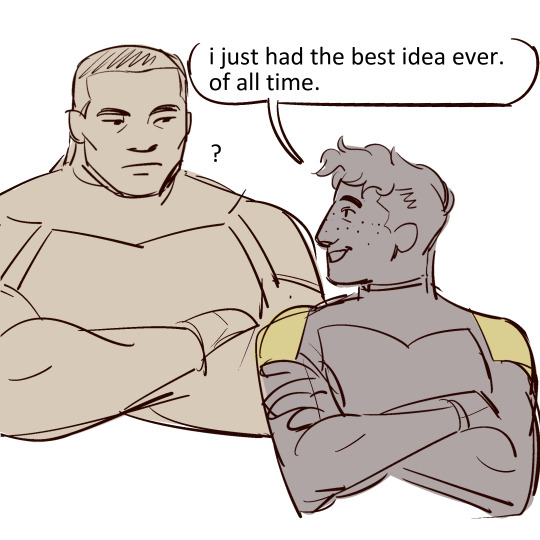

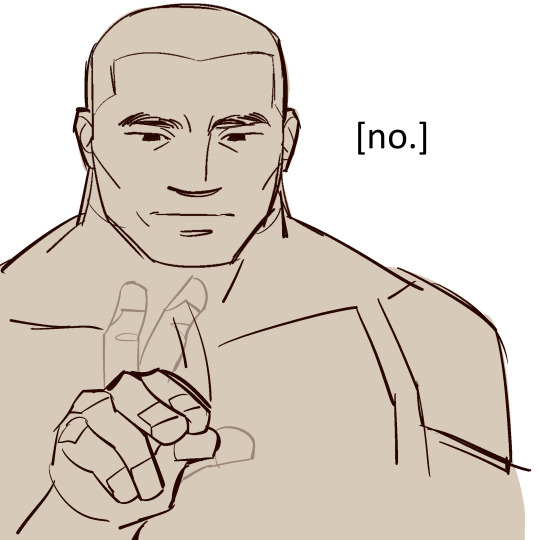
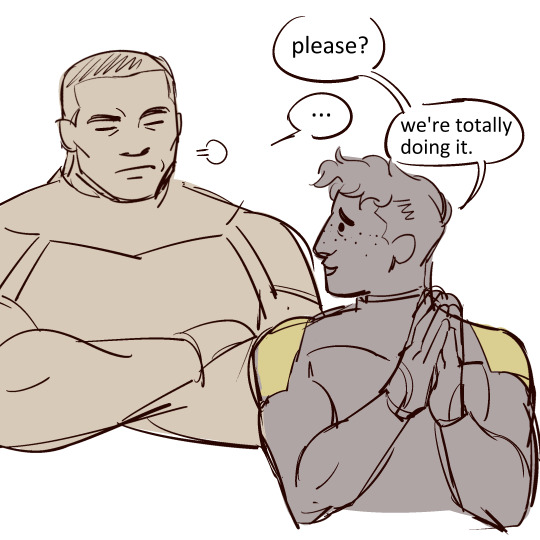
i am so normal about them
#this is early pfl era#i love to draw young pfl wash because then i can contrast it to older post-pfl where he is so fucked up#i seriously feel delusional about them like i know this is so far from canon but let me live let me love let me laugh#rvb#red vs blue#my art#mainewash#washmaine#agent washington#agent maine#rvb the meta
559 notes
·
View notes
Text
Hate it when people erase Dick and Clark’s relationship. "Dick doesn't have a super" ummm actually he does. It's Clark. "Superman and Batman are the World's Finest" WRONG. World's Finest is Superman and Batman and Robin. Clark and Dick are as close as Clark and Bruce. This has been a PSA
#DC#DCU#DC Comics#Dick Grayson#Bruce Wayne#Clark Kent#Nightwing#Batman#Robin#Superman#Robin I#World's Finest#My meta#Dick: has a superhero name derived from a Kryptonian legend which Clark told him#Clark: literally trusts people instantly because Dick vouches for them#Some people: Clark and Dick only interact with each other through Bruce#Like what do you mean what the fuck do you meeeeean#They are UNCLE and NEPHEW and they are BEST FRIENDS goddammit#Clark loves Dick literally just as much as he loves Bruce#Delete later#Maybe
566 notes
·
View notes
Text
I’m actually really sad I have to communicate this, but yall should REALLY consume fandom media created by actual, human people, not AI.
#I don’t have a PROBLEM with c.ai girlies — shit - I use the app sometimes when I’m bored#but for the love of god fandom was created for people BY people#specifically this is about writing. ‘wah I wanna fuck my favorite character but the big bad filter on c ai won’t let me’#YOU HAVE WRITERS!! LITERALLY!! EVERYWHERE!!! THAT POST BEAUTIFUL SMUT PIECES!!!!!#text#text post#fandom#fandom meta#ai#anti ai#writing#writers on tumblr#artists on tumblr
421 notes
·
View notes
Note
Tell me your opinions on the stuff. Any stuff.
Grins. Smiles, even
I'm using you as an excuse to infodump my theory about the Island because I've had no in to do that, and my theory is pure opinion. Anyways:
THE ISLAND IS STUCK IN THE FUCKING FUTURE
(SCARE CHORD)
Hi so you might ask me. What the fuck do you mean by that. Well. Let's start with what we know about the Island, the King, and Wish Craft. (long ass post under cut. sorry)
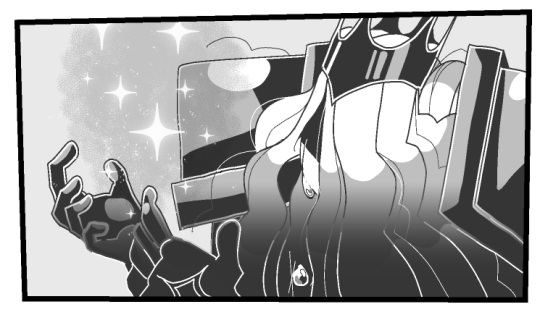
The Island was redacted from the perception of outside world, via Wish Craft.
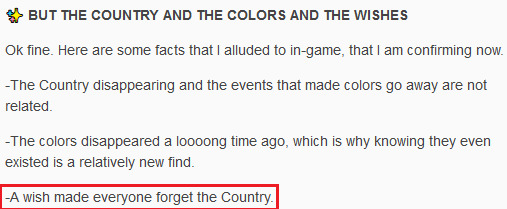
Wish Craft has the power to enable Time Craft. We see this primarily through Siffrin's timeloops, but also through the King's powers.

One of the King's powers is to show the saviors a "vision of the future."
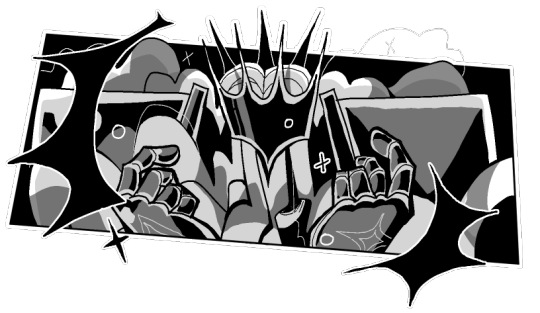
...And this same attack is deflected back at the King by Mirabelle in ACT 5, in which the King is able to see the Island before being frozen in time.
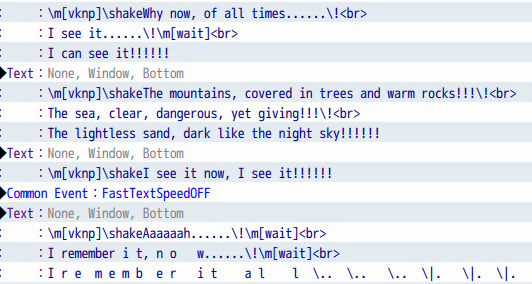
...So. The King's "vision of the future." We're never told explicitly what this vision is. All we know is that it's apparently powerful enough to wipe the party in one hit, hearing it from a distance hurts your head, and that whatever Siffrin (and Loop) saw, they don't seem to actually be able to describe it. Even the King himself doesn't know what his vision entails.


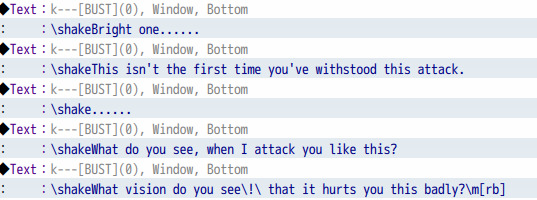
We don't know whether the party all sees the same thing when struck by the vision, and Adrienne's answer to the question about it in the Reddit AMA is. vague? It's not a "no," and the specific wording makes me think the answer might be yes. But that's me reading into it.

Now. What do we know about the Island's redaction? The Island was affected by the wish recently, as in "like a decade ago" recently. We know that nobody in Vaugarde or the rest of the world is capable of thinking about the Island, anything closely tied to the Island's culture, or people on the Island for very long. When they do recall these things, they slip right out of reach. Particularly, the consequence for trying to think about the Island (or, more specifically, break the wish that forces the Island out of perception) is significant pain, localized in the head.
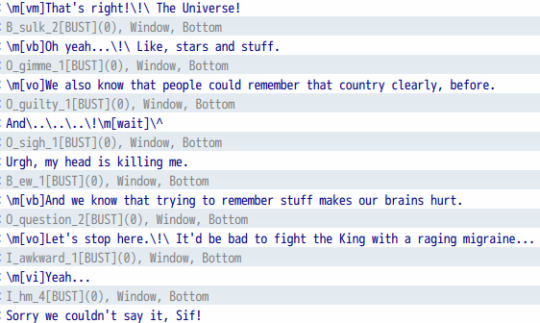
And that said pain is enough to become lethal, if pressed hard enough.
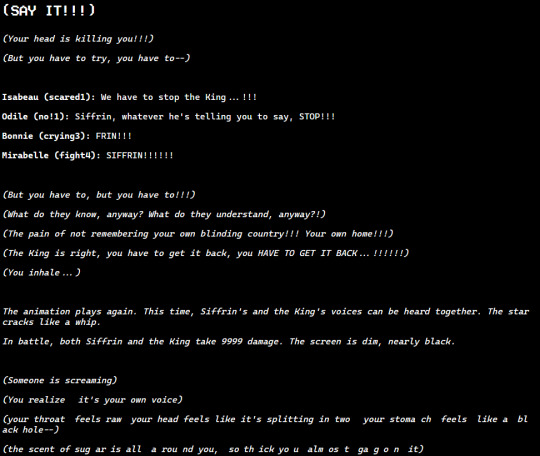
From here forward I'm running with the assumption that the King's "vision of the future" is not personalized to any individual, and is unchanging throughout the course of the whole story. Now. Remember the end of ACT 5, where the King gets hit with the deflected "vision of the future", and instead of dying, he recalls the Island and gets frozen in time? Very odd, yeah? Why wouldn't the King just die like everyone else does? He even does take 9999 damage when trying to say its name, like Siffrin does, and like the party does when they're hit by the attack.
Well. We know that he has a "true wish" that the ability to freeze Vaugarde in time grants. I don't think it's at all a stretch to guess that the King's "true wish" is to be able to remember the Island. My personal guess is that the King (and Siffrin) brought this "true wish" into effect via the "SAY ITS NAME" sequence- he even tries three times, a significant number in wishing.
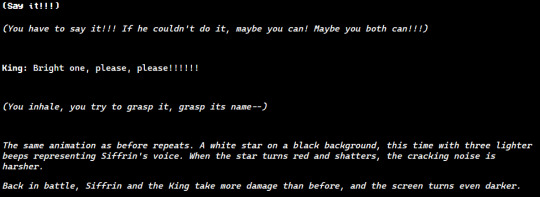


The King (and Siffrin's) wish breaks, because it can't be fulfilled in this moment without breaking the wish to prevent the Island from being thought about. However. Consider the conditions at the end of ACT 5- the King sees the vision of the future reflected back to him, and what he sees is the Island. He remembers the Island, fulfilling his own wish, and is frozen in time. I consider this a compromise between his wish and the one binding the Island- the King gets to remember the Island, but nobody alive is able to think about it, because he's frozen in time; it's like the Universe is correcting itself (I WILL GET BACK TO THIS). The wish of all of Vaugarde to defeat the King is fulfilled, since he is no longer a threat, and Siffrin's wish wraps itself up soon after.
MY POINT BEING. The King's attack is a vision of the future. This "future" is of the Island, in some uncorrupted state. The saviors see it when he attacks them, and he sees it when it is deflected back to him.
The logical next question is "okay, so the Island exists in the future, but how do you know time shenanigans are even related to the Island?"
Recall a very odd series of interactions throughout the game, in which you try to interact with a piece of equipment that you already own.
The game rewinds slightly, before the item disappears, as the Universe corrects itself.

This is awfully similar to two particular events: looping back without seeing the death screen, and talking to the Daydreaming One about her sister. The latter is more interesting to me for the purposes of this theory.
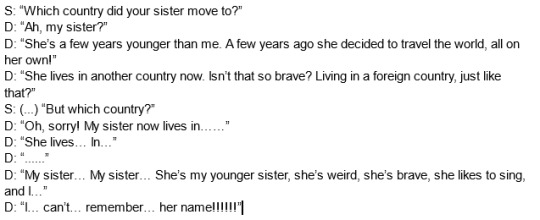
youtube
In both instances, something is misaligned within the Universe (an item existing in two places, someone remembering something they're not supposed to) and it is corrected through some sort of rewind. Also compare the dialogue above to when you try to give Mirabelle the Stylish Bow when you already own it.
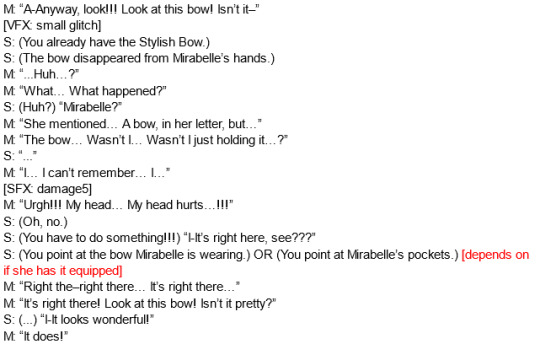
The world glitches, but Siffrin defuses the situation before the Universe has to intervene. Omitted from the screenshot is the fact that Mirabelle's portraits switch to happy from "catastrophically anxious" with no transition after Siffrin shows her where the bow is. Important to note is that when Mirabelle tries to recall receiving the bow, her head hurts, much like how trying to break the Island wish causes a headache.

The Universe leads you away from perception, and you can only follow.
My theory that I keep circling around is that through Wish Craft, the Island has been displaced temporally. The denizens of the Island, as well as the Island itself, still exist, but they are in the future. The Island is still loaded into the world, like how equipment is before you try to interact with it, and the Island cannot leave this quantum state, because it never actually went anywhere. The magnitude of the redaction event is so severe with the Island, because it is so much larger as an entity than a sword or a bow. There are of course things I don't really have pieced together, like why somebody would wish the Island into the future, how far into the future it is, or why equipment behaves this way. But it's the only Island theory I've seen that I have some level of confidence in, so I might as well lay out my cards for it.
#asks#this counts as an opinion right? idk#isat meta#isat theory#isat spoilers#isat#sorry i fucking love talking at people but im terrible at coming up with things without a hook so im just saying Any Words#also i cant have opinions without citing my sources.#i'm literally not even the first person to come up with this theory but it has been slowly eating away at my mind for months#and since that one person in isatcord who is smarter than me brought it up i havent really seen this theory in circulation#so i've been wanting to make a post compiling evidence for it for like. fucking forever#sorry to dunk you guys in images hell but like. I need you to See It. See my vision. of the futu- (is shot)#thank you feli as per always your website is so sexy andawesome and cool and it's the best forever.#(SORRY FOR THE YT EMBED BTW. TUMBLR HATES MEEEE)#this is not the most cohesive theory in the world via both my terrible explaining abilities as well as the holes i mentioned#but i think it's an interesting theory and i want to share it. sorry anon
501 notes
·
View notes
Text
okay before i forget. i've been trying to put my finger on why people saying phoenix and maya are 'sibling-coded' pisses me off so much and I think a big part of it is how important mia is to both their introduction and also the foundation of their relationship and how calling phoenix and maya 'siblings/sibling-coded' waters down all of their relationships
phoenix wishing that maya was mia is a very big part of maya's arc as well as a big sticking point in phoenix and maya's relationship. phoenix spends the majority of turnabout sisters wishing that 'the chief' was there and when maya fails to channel her he shows outward disappointment. this is something that maya obviously picks up on and internalizes as we see throughout the rest of the games. most notably maya shows remarkably little self-preservation, throwing herself at von Karma's taser and in contempt of court to help edgeworth (and by extent, phoenix). she openly admits to feeling useless when she can't channel mia and phoenix never refutes this out loud until he of course presents the bullet to her showing that she wasn't useless. phoenix is notably bad at expressing his thoughts/ and feelings so its honestly debatable whether this gets through to maya but thats neither here nor there
on the other side of it, maya wishes that phoenix would be the caring adult figure that she was missing for most of her life (and especially after mia dies) and phoenix does not do a great job of being that figure. he likes her sure, and they're good friends, but he's definitely not nurturing or sensitive whenever maya is in distress. at the end of turnabout sisters when mia tells maya to "take care of phoenix" for her, maya starts calling him nick (because that's what mia said phoenix's friend calls him) and their dynamic for the most part is solidified. maya is not able to find mia in phoenix and accepts him as his own person and a part of her life as a friend.
phoenix has a more complicated journey with viewing maya as her own person partially because of the whole spirit-channeling thing, and partially because maya is younger than both the chief and himself. phoenix is constantly looking to a mentor for guidance and feels out of his depth for most of the cases in the trilogy. he frequently wishes that mia could be there, and is shown to value maya's ideas less, or at the least question them more at face-value. nevertheless, by the second game phoenix relies on maya greatly as shown with how he copes (or fails to cope) with her absence in rfta and 2-4, and 3-5. phoenix views her as both an integral part of his life and support structure, but also views her as someone he has to put on a brave face for, much like pearls. maya is phoenix's young friend that he leans on and wishes to protect.
maya's love for her sister is a core theme that spans the entire trilogy and culminates in maya almost dying in 3-5. phoenix's love for mia is a constant driving force that pushes him past what he believed himself capable of, and encourages him to trust those who become those closest to him. phoenix and maya's relationship is colored by their own relationships to mia, and how they view each others relationship with mia. they both represent a part of her that they never knew as well as a part of her they can keep loving in her place after she is gone, but most importantly, neither of them will ever be mia. no one else can be maya's big sister and no one else can be phoenix's mentor. they meet each other as two strangers set adrift by the same lost mooring, and though they'll never be secure in the way they were before meeting each other, they have a friend to help keep themselves afloat.
#okay im mad enough that this is going in the main tag#genuinely send me hate mail for this id be fucking Delighted ive had a hard week and id love to vent my frustration#also if anyone decides to be snarky in the tags your ass is getting screenshotted with the water filter so i can laugh at you#ive had it up to HERE with you people#aa#fey and co#aa meta#portal of rambling#maya fey#mia fey#phoenix wright
238 notes
·
View notes
Text
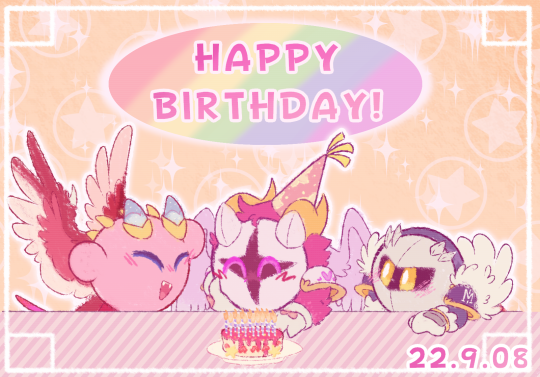
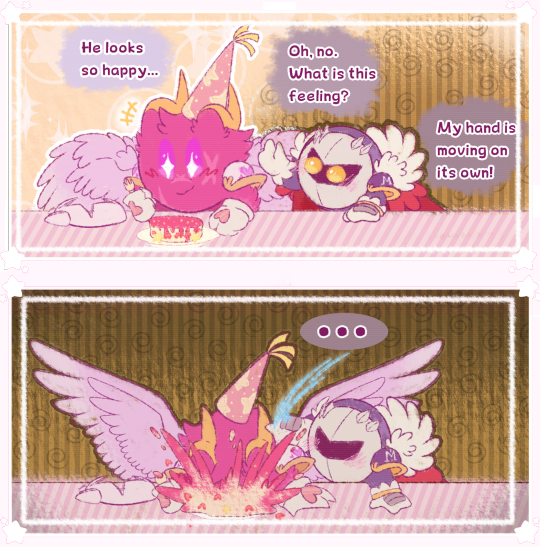
HAPPY BIRTHDAY, GALACTA KNIGHT!!!! And congratulations to Meta Knight for experiencing the Cain Instinct for the first time.
Galacta Knight, as you might've been able to tell already, is one of my favorite characters, and KSSU is one of my favorite games (the original SS was my introduction to Kirby!) so I wanted to go all out. Happy day, old man. I pray for at least 20 more years.
Oh, and don't worry! He's not upset about the cake smash, he thinks it's funny. And he got back at him.
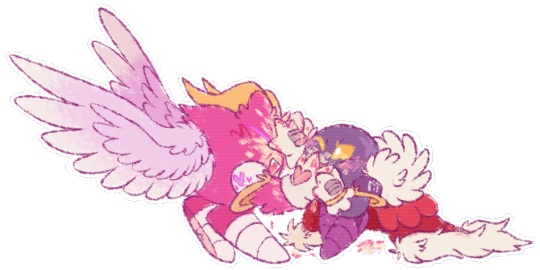
As for the in-universe explanation for there being 16 candles in his cake?
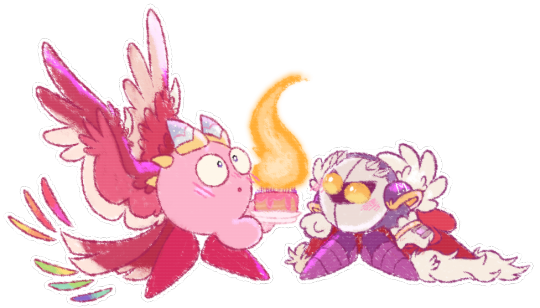
... 500+ didn't fit in safely.
The birthday boy and his family were just a bit too flammable.
#kirby#kirby series#galacta knight#meta knight#umm idk why i colored the text i don't talk like this#anyway average latino birthday party occurrence#i experimented this time !! i'm not sure about it but i like how this ended up looking anyway#i think it definitely works better on a smaller scale#anyway. TEENAGE KIRBY REVEAL. he's like 12-17 here. and mk's gay little outfit reveal too#i decided to go this direction because#1 - timeline accurate#2 - the red cape just fit better with the whole color palette#3 - i love drawing fluff#and 4th and most importantly. i just wanted to#did you know there was supposed to be more parts?#i might post them eventually#though they're nothing special#funny mk expressions though#my art#all of these were done while listening to g3 mlp songs in the background on loop#i want you to take that as a warning#because one of these days i'm gonna break#and make something really cringe#EDIT: WHERE THE FUCK IS MY TRANSPARENCY#promise the second one isn't supposed to look that ugly
276 notes
·
View notes
Text
THK's Fadel is such a character of contradictions and curiosities:


He's so casual about the assassination stuff: look at the careless, almost silly way the guns are 'disguised'; the nonchalant way he's carrying himself right before he kills.


But then look at the precision and care he's taking while prepping tomatoes for his cover job. The way he leans down to salt the meat for his burger - he's taking it incredibly seriously.


He takes the time to chide Style about road safety even whilst trying desperately to get away as soon as possible because he literally has murder evidence in his car.


The whole assassin thing is a family business that has "ethical reasons", but is this a cause he has chosen, genuinely, for himself...


...or is it just what he tells himself to make it easier to keep living this life because he knows there's no escape?


Was this a lesson learned in theory from their mother, or from painful experience? Who hurt you, baby boy? Could it be related to the (knife?) wound on his chest (heart)?




For someone who supposedly just wants to get rid of Style, he sure lets Style get close and deliberately gets very handsy with him. Not to mention it was Fadel that sought Style out first after their initial encounter. Was Style's the only auto shop he could go to? I'd assume money isn't actually an issue for them.


I love that the show makes it clear that he loves Bison and is genuinely worried for him. The show sets up Bison to be too trusting but also naive and impulsive (Bringing a loaded gun to karaoke? Really, Bison?), so Fadel's worry and protectiveness may well be warranted. And even then, for all of Fadel's strictness, he gives in to Bison a lot and the way Bison speaks in that whiney pleading tone hints that he knows he's got his older brother wrapped around his finger. He's Katherina, but they're signposting why.
He fascinates me on so many levels and I can't wait to learn more about him. <3
#the heart killers#the heart killers the series#fadel#fadelstyle#thk meta#fadel meta#ok for sure part of it is that joong looks so fucking hot in this episode#but there's undercurrents that i'm very excited to see more of#i also adore that fadel and kant have their love for their little brothers as something in common#joong archen#rambles about shows i'm watching#<my posts>
228 notes
·
View notes
Text
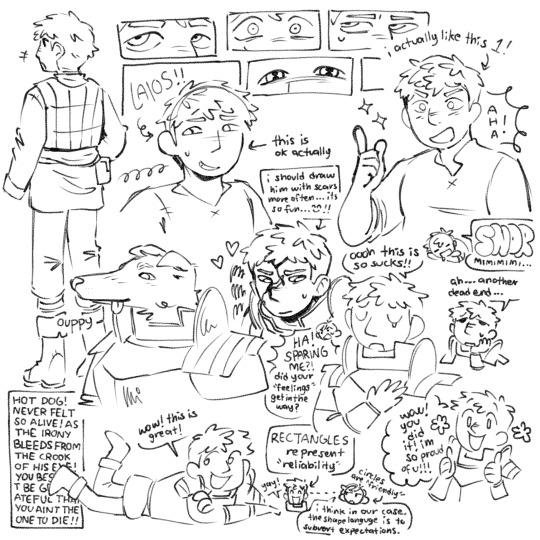




doodles from varying times :] kicking my feet and giggling. put your hand in my cage youre safe :]
#hehehhe i love it when they get to be weird and scary (see: fucked up upsidedown chilchuck)#also the orpheus thing. hear me out okay.#how do i explain to people who dint think about chilaios about the endless trust and betreyal cycle themes. fuck!!#oh well it doesnt matter if i say it here youll get it soon cause im tempted to write a short meta for the two of them#clutches my head. YOURE GONNA GET IT I SWEAR!!!#anyways#chilaios#chilchuck#chilchuck tims#laios#laios touden#uhhh sure ill put it in the main tags why not#dungeon meshi#aaaand#[ tragedy au ]#if you can even figure out which ones are part of it HAHAHA#tragedy comedy
329 notes
·
View notes
Text
You know I'll be first to point out if/when Crocodile does a little Luffyism, so let's take a moment to appreciate it when Luffy does a little Crocodile-ism;
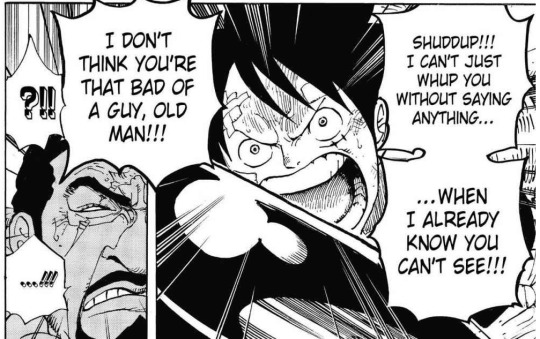
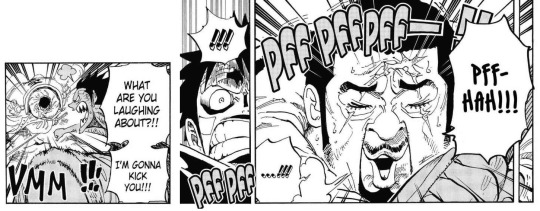
Like Luffy may be a silly lil goofball, but as he's said many times himself, he's always serious (in combat). And so Fujitora laughing at Luffy right in his face, when they're in battle and Luffy is completely dead serious... Yeah, the way he takes it like an insult gives Crocodile

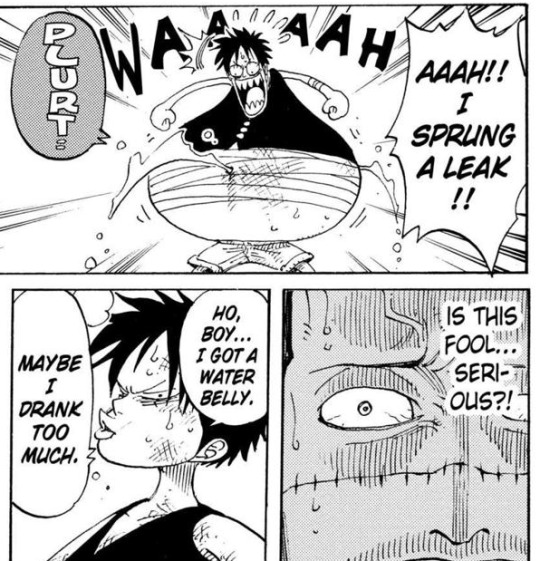

#Moon posting#OP Meta#Crocodad#Same with Luffy getting angry at Kaidou when he got drunk mid-battle#To be fair there's probably more examples of this exact kind of gag#(Kumadori taking A Little Snack in the middle of the Enies Lobby fight. Or Chopper fucking around with Franky's hair.)#(Sanji vs Wanze probably had something like that too that I'm kinda forgetting)#So this isn't like inherently Crocodad Propaganda it's just a type of gag Oda does often#But I'm here to spin it as if it were Crocodad Proof because I have an Evil Agenda to push and propaganda to spread teehee#I did finally finish rereading Dressrosa and I have some Thoughts I'd love to share but. I have work to do so IDK when I'll get around to i#(But it's about Luffy's feelings about Rebecca reuniting with her dad)
205 notes
·
View notes